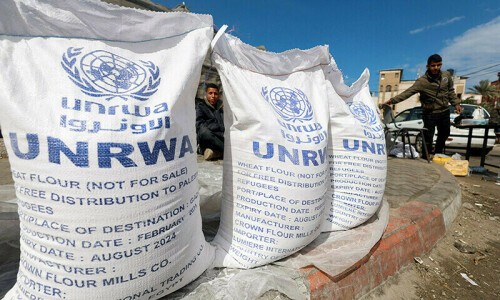KARACHI, Feb 6: The controversy over the treatment of ‘impairment’ of values of investments in listed securities on the books of companies, has stirred a hornet’s nest.
As realisation dawns of the scale and magnitude of the problem that has the potential of pushing the stock market into another major crisis, a meeting of all stakeholders has been called by the Securities and Exchange Commission of Pakistan (SECP) on Saturday at the Institute of Chartered Accountants of Pakistan (ICAP) to try and find a common ground.
Initiated by the Mutual Fund Association of Pakistan (Mufap), the meeting would be attended by all stakeholders, such as the associations of banks; insurance; leasing; companies on various stock market sectors and the ICAP executives.
Sources close to the matter told Dawn on Friday that the SECP would act as a moderator.
“Considering the gravity of the matter, this being the reporting season, the SECP will announce a decision as early as on Monday,” says a stakeholder.
Mufap chairman Najam Ali confirmed on queries that the best of accounting brains would go into a debate over the issue on Saturday.
The controversy came to the fore following the declaration of financial figures by Nishat Mills Limited for the six months ended Dec 31, 2008.
Standalone, the company posted a hefty 128 per cent rise in earnings to Rs1.2 billion, from Rs525 million earned in the corresponding period of the previous year.
The accounts were, however, accompanied by an auditor’s qualification, which went to state that the “fair value of investments available for sale in quoted companies,” had been recognised directly in equity instead of ‘impairment’ loss through profit and loss account as required by the International Accounting Standard (IAS) 39. And so the auditors concluded: “Had the impairment loss been recognized through profit and loss account, profit for the year amounting to Rs1.197 billion would have been converted into loss of Rs1.856 billion.”
As the stock market turmoil of 2008 had plunged KSE to a record fall of 66 per from its peak prices and 31 per cent drop in 4QCY08, the problem could be believed to be widespread with companies heavily invested in equities firmly opposed to the view of the auditors.
The meeting of all stakeholders to resolve the matter was understood to have been initiated by Mufap with its chairman Najam Ali, who also has to his credit the earlier unraveling of the complex matter of CFS settlement.
He did not mince words in speaking against the rigid application of IAS 39.
He contended that the concept of “fair value accounting” had been a subject of heated debate and criticism all around the world.
“In the Pakistani context, due to an unprecedented situation, the standard needs to be set aside,” Najam says.
The Mufap chairman said that one major anomaly in exercising the IAS 39 related to the fact that there was no provision of reversal of ‘impairment’, if the securities were to regain their value.
“The capital gain can only be recognised when the securities are sold,” he says. It is difficult to tell which side, among the various stakeholders favours what, but from discussions with various related people, it could be deduced that the ICAP wanted to go by the book and apply the IAS 39 and 36, which stipulated that significant and prolonged slump in fair values of investments that resulted in impairment had to be recognised in P&L account rather than in equity through adjustment in revaluation surplus. But the industry was opposed to that view on the ground that the implications of the two IAS 36 and 39 would overshadow the profits of companies, with major investment portfolio, when the carrying amount of investments, which would exceed the fair value (recoverable amount) would result in impairment loss in P&L.
Analysts pointed to several other blue chip companies holding large equity portfolios, that inevitably be up in arms were the auditors to qualify the accounts in similar way as in the case of Nishat Mills.
Some of such companies were identified as D G Khan Cement; Packages; Dawood Hercules; Habib Bank; MCB; ABL; NBP and BAFL.
Mohammad Sohail at JS Global observes: “Whether the impairment of value is temporary or permanent and should it be routed through Equity or P&L will remain a major risk to the reported profits of key companies.”
He recommended that the regulators should clarify the matter. Left to themselves, the companies would post a profit/loss which might be at a wide variance with the figures that auditors had in mind, just like the case of Nishat Mills.
Knowledgeable people at the market admitted that such an ambiguity had vast potential of creating confusion in the mind of investors. And nothing would be more harmful and misleading for investors than an inconsistent treatment to the impairment in value of securities by different companies. Such inconsistency in reporting would ‘materially’ impact the price of a company’s stock.
There were reports that the SBP had allowed banks to take half the loss in the year under report and the other the next year.
Najam Ali of Mufap thought the idea to be unworkable.
On Jan 30, the SECP had issued a clarification, a repeat of which was released on Friday, stating that for the purpose of preparing the financial statements for the period ended Dec 31, 2008, companies might use market price as quoted on the stock exchanges on Dec 31, as fair value of securities.
“The resultant revaluation surplus/deficit would be treated in accordance with the IAS 39,” the regulator stated.
Most analysts thought that the statement raised more questions than it answered.
Meanwhile, the accountancy profession was eagerly waiting to see the outcome of Saturday’s meeting, which could set a new standard for reporting of financial statements.

















































Dear visitor, the comments section is undergoing an overhaul and will return soon.